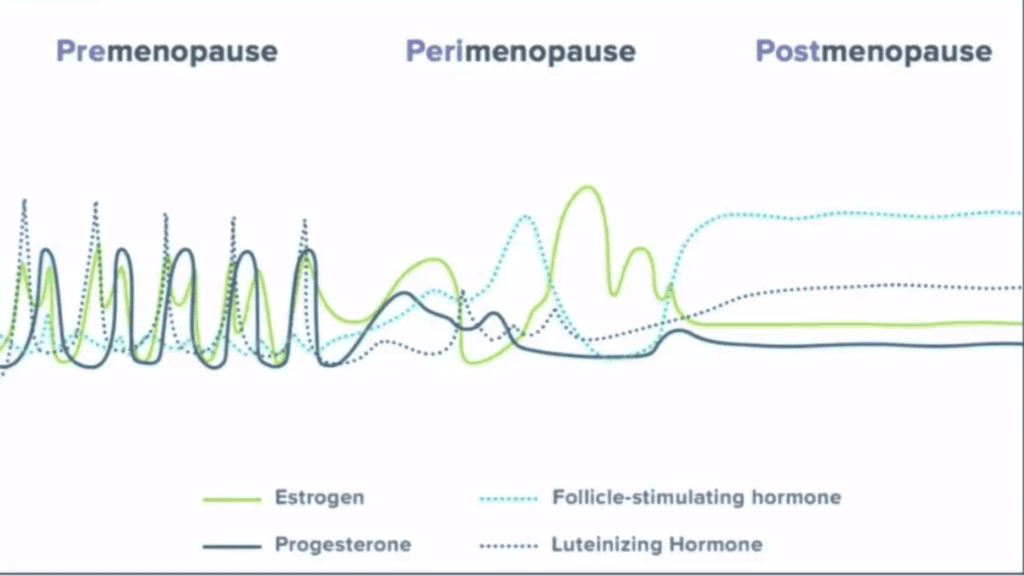Are you experiencing any of the following perimenopause symptoms:
• Unusually heavy or light menstrual flow?
• Shorter menstrual cycle lengths (≤25 days)?
• New sore, swollen, and or lumpy breasts?
• New or increased menstrual cramps?
• New mid-sleep wakening?
• Onset of night sweats, especially around flow?
• New or increased migraine headaches?
• New or increased premenstrual mood swings?
• Notable weight gain without changes in exercise or food intake?
• More low blood sugar (hypoglycemia) symptoms?
Are you in your late 30s to early 50s? Then you may be making the very normal and anticipated transition into perimenopause.
What is Perimenopause? Comparing Perimenopause and Puberty.
Perimenopause is the eventual fate of all menstruating women. It is similar to puberty, only in reverse, and just as puberty was a hormonal wild ride for many of us, so can perimenopause be. It is often a roller coaster of physical symptoms and emotional ups and downs that make this normal transition into menopause so uncomfortable. Three factors that make this transition potentially more harrowing than your passage into puberty are:
1. Age: You were young when you went through puberty…that seems obvious, but with youth comes metabolic resiliency. You do everything quicker and easier than when you are in your 4th or 5th decade.
2. Life happens: years of environmental exposure, stress, illness, and poor-quality food have taken a toll on your youthful body. Every uncomfortable symptom of perimenopause is made more intense by inflammation and cellular dysfunction brought on by the environmental assaults that modern life brings.
3. The length of the transition: puberty is usually a relatively quick event that only takes a few years to complete. Perimenopause can be a much more complicated transition depending on your overall health and stress levels. Therefore, it can take a decade or more before the shift into menopause is finalized.
Let’s look at what is taking place during this transition so you can understand why you are feeling so strange.
In your 20s and 30s your reproductive organs are primed to bring new life into the world. You are born with somewhere between 1 and 2 million eggs (oocytes). Under normal circumstances, once you reach puberty, you begin to prepare up to 1,000 eggs per month for maturity. One lucky, “fully cooked” egg is selected for ovulation. Month after month you deplete your egg supply and by the time you reach your 40s, your ovaries may contain only 5,000 to 10,000 eggs and only a few hundred at age 50.
This process of egg selection and removal is signaled by a collection of reproductive and metabolic hormones. The creation and release of your reproductive hormones is a complex dance, orchestrated by several body systems: your brain, adrenal glands, thyroid, and ovaries. This process is also dependent upon the daily and monthly environmental rhythms of the sun and the moon. This sounds a little woo-woo, but the circadian pattern of the sun and moon is the master clock for all cellular functions, especially the functions that are directed by your monthly cycle.
This diagram from the Kharrazian Institute depicts the monthly pattern of your reproductive hormones throughout the cycling stages of your life. The normally regulated and wave-like pattern of your hormones is replaced by a dysregulated ebb and flow as your body tries to completely clear out the inventory of eggs. Finally, after one full year without a monthly period, you have moved into the stable hormonal levels of menopause.
An Overview of How to Manage Beginning Perimenopause Symptoms
If you think that you may be moving into perimenopause, there are several factors that will help to make this transition more comfortable.
• Nutrition – Eat three real food meals per day. Meals should contain adequate protein, healthy fats, and complex carbohydrates.
• Stress Management – Use techniques such as meditation, yoga, music, and nature bathing to make your body more resilient to the stressors of life.
• Sleep consistency – Give yourself an 8-hour sleep window with consistent bedtime and wake times seven days per week.
• Reduced exposure to environmental toxins, especially plastics – Give your home and office a toxin spring cleaning. Stop drinking from plastic bottles and storing leftover food in plastic containers.
• Microbiome support – More important than taking a probiotic, eat plenty of vegetable and fruit fiber to feed your beneficial bacteria. Improve digestion by taking a digestive enzyme.
You can create a happy and comfortable transition into and out of perimenopause with a healthy lifestyle, good nutrition, and targeted supplements. Let me know if I can help!

